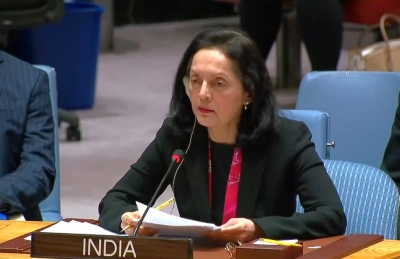

Ruchira Kamboj, India's Permanent Representative to the United Nations
India’s Permanent Representative to the United Nations, Ruchira Kamboj questioned the fundamental structure of the Security Council and asked that by making five members more equal than others, does the principal organ be considered as inclusive.
While addressing the United Nations Security Council during the open debate on the topic of ‘future-proofing trust for sustaining peace’, Kamboj said that from the Indian delegation’s perspective, if the council has to future-proof or secure the future, one needs to first and foremost draw the right lessons from history. “Is the Security Council in its present form which denies permanent representation to entire continents of Africa, Latin America, and the world’s largest democracy can it deem to be inclusive by making five members more equal than others?” she asked.
She further asked the organization “Does the Council’s normative framework eliminate inequality or does it tend to perpetuate it? Will we be able to credibly improve the Council’s effectiveness at any stage when it is a fact that we don’t even have a time frame for concluding the decadal discussions on Security Council reform? And can we actually be future-proofing trust for sustaining peace through the Council till we arrive at credible answers to these core questions?”
Talking about the fundamental steps that the Security Council to make the organization inclusive and normative frameworks, Kamboj said that multilateral institutions must be made more accountable to their membership. The institutions must be open and welcoming to a diversity of viewpoints, particularly from the global south.
The Council must be made more representative of developing countries if it is to continue to engender trust and confidence in its ability to provide leadership to the entire world. It can deliver effective solutions only if it gives a voice to the voiceless, she said.
The permanent representative to the UN also stated that the Security Council should also respect the regional approach adopted by countries involved and work in collaboration with regional organizations to address peacebuilding challenges. We believe that regional organizations have an important role to play in tackling global challenges with the UN and the core of multilateral efforts.
A comprehensive approach focusing on sustainable development, inclusive economic growth, and political processes is critical for peacebuilding and sustaining peace.
Union Minister of Coal and Mines G Kishan Reddy on Tuesday held an inter-ministerial meeting…
India's largest automobile in-plant railway siding at Maruti Suzuki's Manesar facility started operation on Tuesday,…
Google on Tuesday unveiled its Safety Charter for India's AI-led transformation, at the "Safer with…
The human rights organisation of the Baloch National Movement (BNM), Paank, has published its most…
The Israel Defence Forces (IDF) on Tuesday claimed that it has killed Iran's senior-most military…
Amid escalating conflict between Iran and Israel, the Ministry of External Affairs (MEA) on Tuesday…